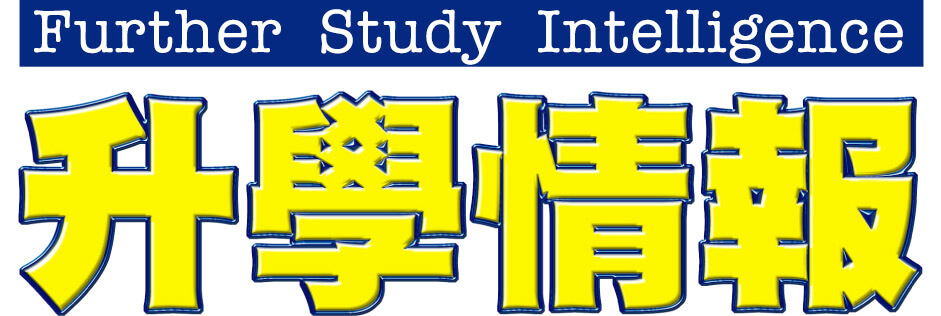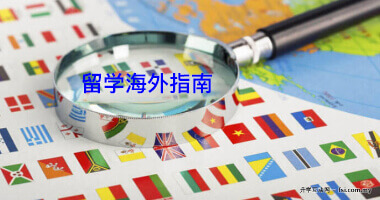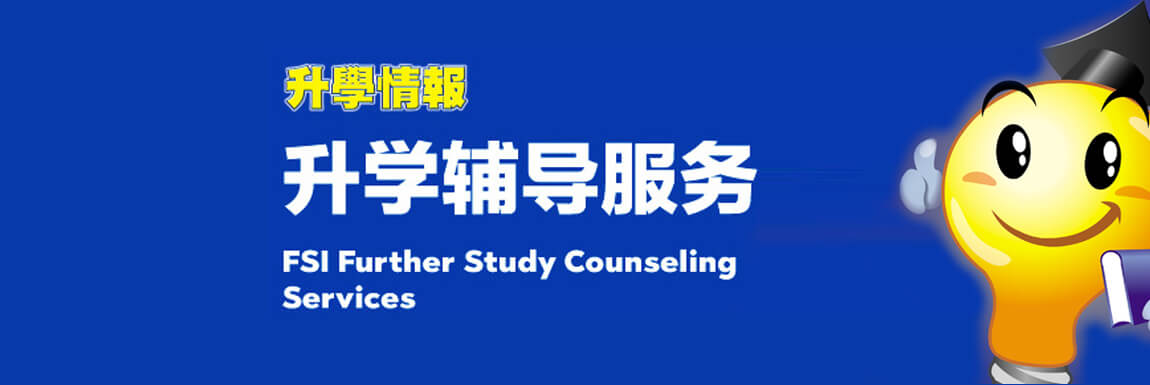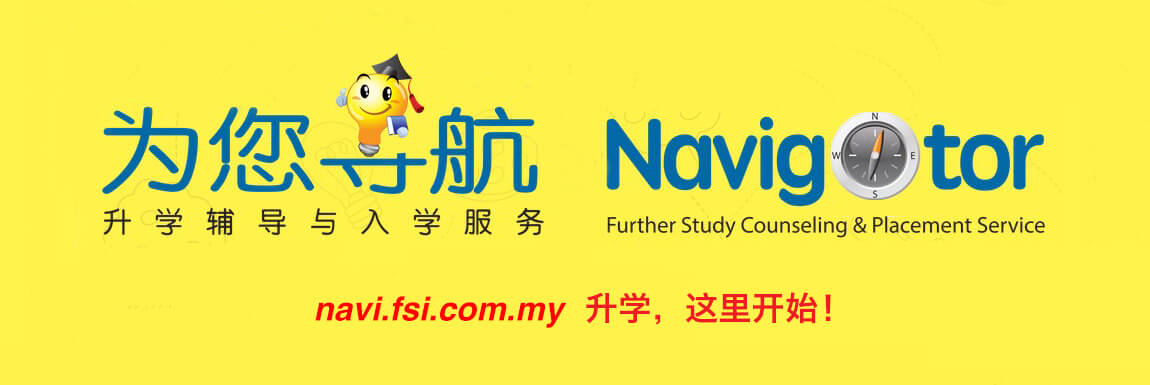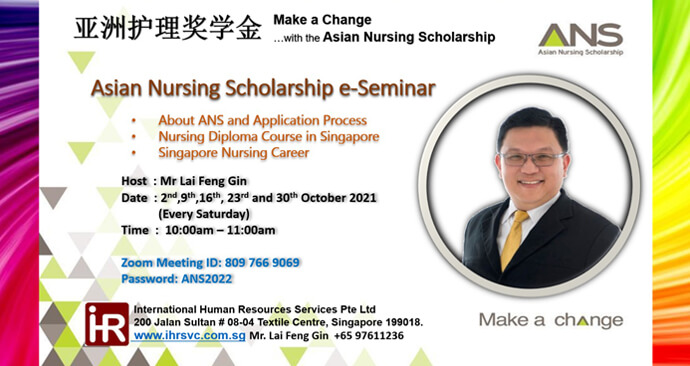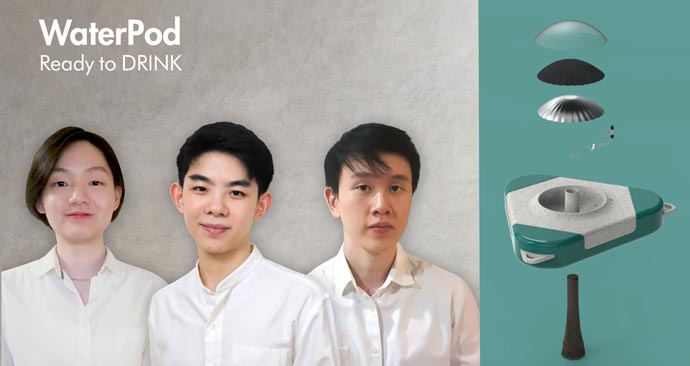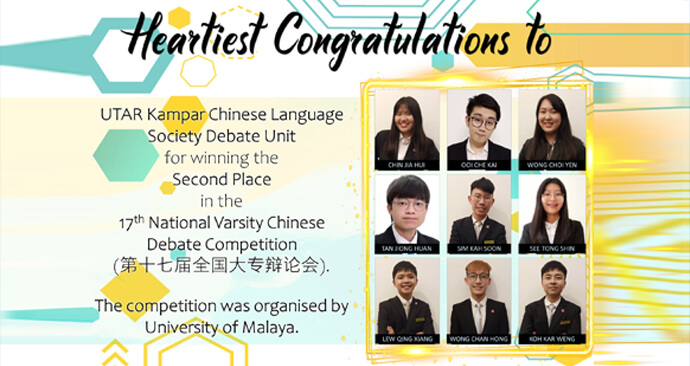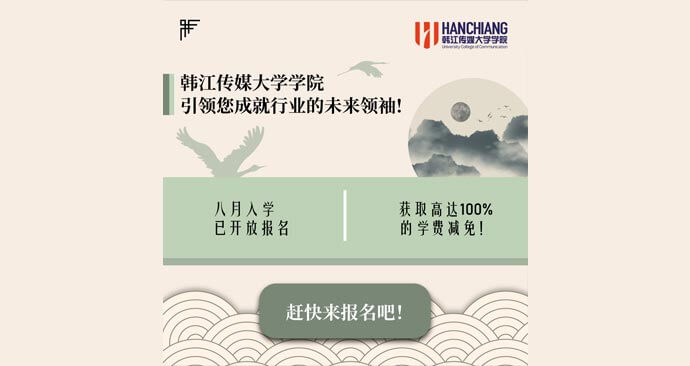UTAR celebrated triple success for winning first and double third prizes in “SIMS Challenge 2020 – Innovative Application of Game Technologies” held on 5 November 2020. Three teams, namely MDR Observers from Faculty of Medicine and Health Sciences (FMHS), Alchemist from Faculty of Information and Communication Technology (FICT) and Cells-at-Work from Faculty of Science (FSc) walked away with first prize, third prize I and third prize II respectively.
A virtual event showcasing games for healthcare training and education, the SIMS Challenge 2020 (Finals) was organised by Serious Games Association. Out of six finalists showcased in the challenge, three winners were from UTAR.

The champion team, MDR Observers was comprised of FMHS academics Dr Aw Kar Men and Prof Dr Ngeow Yun Fong. The duo walked away with a cash prize worth S$500 and a trophy for their game titled “Total Defence”.
Dr Aw explained, “The game “Total Defence” is a take on the tower defence genre. The player plays the role of an army commander defending his military camp (bacterial cell) against attacking enemies (antibiotics). The player has to use his or her towers/soldiers (antibiotic resistance mechanisms) to prevent the enemies from reaching and destroying the central command station (nucleus) in the player’s camp. Each antibiotic can be repelled using a specific defence mechanism or a combination of defence mechanisms. Each type of antibiotic has a weakness and it is up to the player to utilise the best type of defence to defeat it. The game starts with the player placing his/her defences in strategic locations to prevent the antibiotics from entering his/her camp.”
Meanwhile, the first team to win the third prize was named Alchemist from FICT and the team was comprised of Bachelor of Computer Science (Honours) students Lim Jia Jun, Goh Xin Yun, Alisa Yap Yi Hui and Tan Jia Phei; Bachelor of Information Systems (Honours) Information Systems Engineering student Chai Zhi Kong; and FSc’s Master of Science student Chen Sook Ngoh. The team was supervised by FICT lecturer Ts Saw Seow Hui and they walked away with a cash prize worth S$75 and winner’s trophy for their game titled “Perfect Potion”.

Explaining their games features, team leader Lim said, “Perfect Potion is an interactive drug simulation game which includes real-world drug crafting and dispensing mechanics. This game is created in a fantasy world setting, where the real-world drugs will be referred as “potions”, while the player will be referred as the “alchemist” in the “potion store” in a small village. As an alchemist, the player will need to work with the “doctor” (act as the doctor in real life) to craft various types of potions and dispense them to local “patients” (act as patient in real life).”
He also enthused, “I joined the competition because of the opportunity to learn from the game developers provided by the organiser. Unfortunately, due to the Covid-19, everything did not go as planned earlier. Thus, I switched my perspective from a learner to a leader. I felt lucky that my proposed game idea was shortlisted during the first round. After a team of six was formed, we spent weeks to build the prototype using some game development software but we were not able to complete it due to insufficient time and knowledge. Hence, we switched to create a story-board instead, which was also allowed in this competition as a method to present our idea during the final round. This competition offered me a chance to gain substantial experience, showcase my leadership skills, make decisions based on the unexpected situation, analyse and evaluate the outcomes and uncover my personal aptitude. I was able to adopt some new innovative techniques to develop my ideas and skills.”
On the other hand, the team’s supervisor Ts Seow Hui added, “This was an exclusive competition where the participants were able to learn, train and practice the skills of the healthcare industry via game development. Although my major is not in game development, it was interesting to know how to deploy a game into something serious and enhance someone’s learning capabilities. Thus, I think this is beneficial to the students, researchers and academics.” She also said, “I have never imagined forming and coaching teams from FICT to participate in the SIMS Challenge 2020, what more winning. It was really an eye-opening experience for me and all the participants who had worked diligently and never give up when they encountered difficulties. I am very proud of them and would like to thank them for their enthusiasm.”

Last but not the least, the second team who won the third prize was named Cells-at-Work from FSc. The team was comprised of Master of Science students Yeap Yee Hung, Chen and Lim Zhi Meng; and they were coached by FSc lecturer Dr Saw Seow Hoon. They walked away with a cash prize worth S$75 and winner’s trophy for their game titled “Towers of Immunology”.
The team leader, Yeap explained, “It is a tower defence game whereby the player defends against incoming waves of pathogens, which includes COVID-19, other viral infections and bacterial infections, using various lymphocytes and phagocytes. Different stages within the game will represent different locations within the body, from lymph nodes to distant blood vessels, each presenting to the player varying conditions such as advantages and disadvantages to overcome. The deployment time and effectiveness of each lymphocyte will highlight the usefulness of the lymphocyte type under different situations. The goal of the game is to prevent a certain number of pathogens from successfully passing to the other end of the stage using the immune system as an offensive and defensive force.”
He added, “We joined the competition due to a keen interest in applying what we have learnt into game design, as we felt that some knowledge can be easily taught through gaming. We felt grateful for winning the competition as we had such a short time to prepare without any external assistance. We believe that we learnt a lot about teamwork and time management through this competition, which would significantly aid us in future undertakings in FSc. “Towers of Immunology” is a tower defence game which applies immunology concepts into game mechanics. We aim to help players understand and memorise basic immunology concepts such as innate and adaptive immunity, cytokine effects and antibody types through gameplay.”
The coach Dr Seow Hoon added, “It was a brand new, exciting and motivating competition to a science lecturer. I am not trained in any of the game design, but this competition opened up my eyes to the world of games. Science learning can be so fun. I am overjoyed and proud of my students’ achievement. Even though, they were from the Faculty of Science and not fully from the healthcare industry, that did not stop them from winning. I just wish to encourage all students that no matter which fields or areas you are in, you will still be able to achieve your goals beyond your boundaries. What you need is the determination and anticipation to do so.”
She also explained, “Game-based learning is a pedagogical approach that comes with the notion that the world can be brought into the classroom in a way that allows participants to actively engage with and immerse themselves in the material. Games offer an excellent way for learners to build knowledge and skills in a learning environment that they can control. For the trainers, it opens up new spaces for interaction and moves the focus to learner-led learning. This is succinctly captured by the proverb: “I hear and I forget. I see and I remember. I do and I understand.” We can indeed conclude that simulation games are especially good for exploring relatively complex topics, with many dimensions and factors but the main focus is the development of skills. In addition, through this competition, students are able to enhance their creativity and critical thinking skills as well as improving their communication skills.
Held for the second time since 2019, the SIMS Challenge 2020 is an innovative healthcare simulation game design competition organised for higher learning institutions students, academics as well as researchers.
Online Education Fair 线上教育展
Universiti Tunku Abdul Rahman (UTAR)
拉曼大学
https://edufair.fsi.com.my/utar
